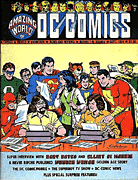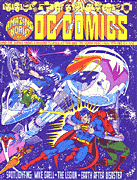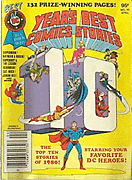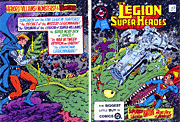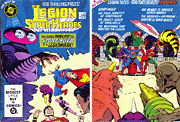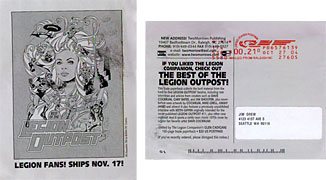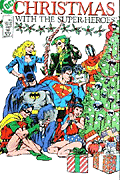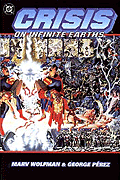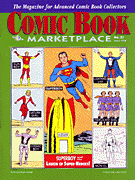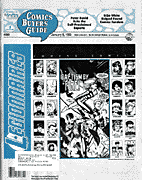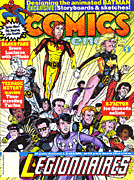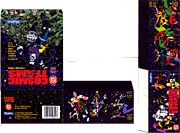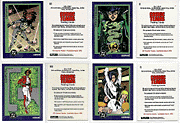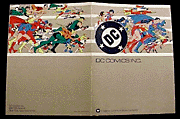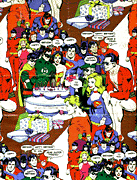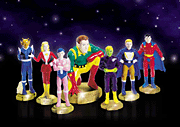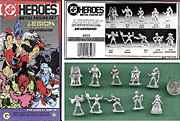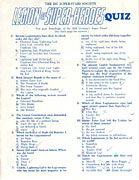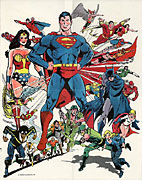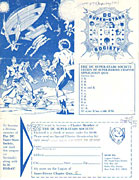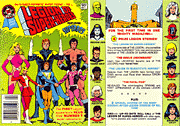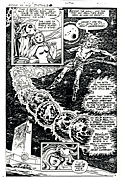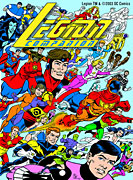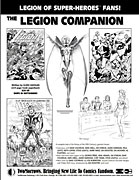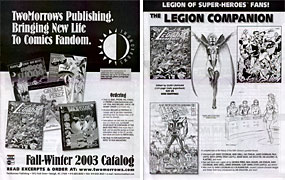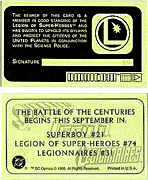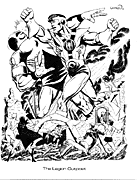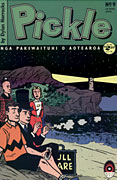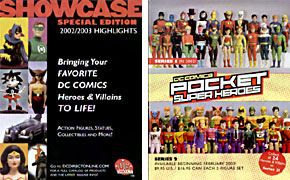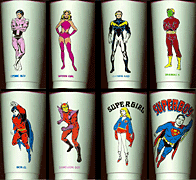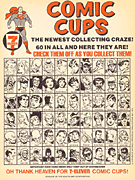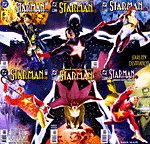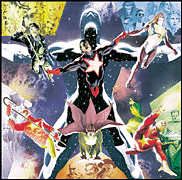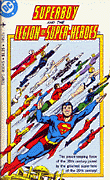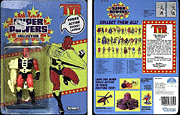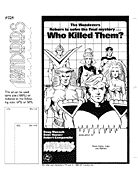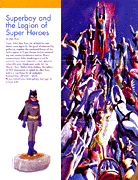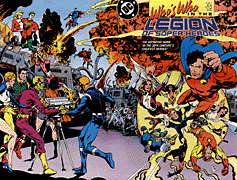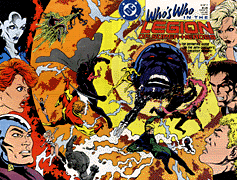Miscellaneous Legion Items
(Hard to Find Comics, Merchandise, and Promotional Items)
|
|
| |
Released in September, 1974.
Includes an interview
with then-Legion writer Cary Bates. (Mon-El and Invisible
Kid are on the cover.)
Cover art by Kurt Schaffenberger.
(Special thanks to Michael Grabois for supplying this item.)
|
|
|
|
|
| |
Released in August, 1976.
Includes an interview
with then-Legion artist Mike Grell, and the first image of
Legion Academy member Nightwind (then known as Nightwing).
Cover art by Mike Grell.
|
|
|
|
|
| |
Released in April, 1981 (?).
Ah, back in the
days when enough Done-in-One stories were being produced
to be able to chose from them to produce an annual “Best
of” issue.
Along with nine other stories, this includes the Legion
story from XXX.
Cover art by XXX.
|
|
| |
|
|
| |
Released in September, 1985.
Includes Superboy #117, Adventure
Comics #330-331 (Dynamo Boy), Adventure Comics #332
(Super-Moby Dick of Space), Adventure Comics #333,
and Adventure Comics #333 (Unknown Boy), plus text
annotations by Paul Levitz and four pages of art featuring
Legion clubhouses (by Cuti / Sherman / Abel, Bridwell / Janes
/ Chiaramonte, and Cuti / Giffen / Mahlstedt; the first and
third were presumably done just for this digest).
Cover art is uncredited (unreadable signature in the asteroid).
|
|
|
|
|
| |
Released in December, 1985.
Includes Adventure
Comics #335-336 (Starfinger), Superboy #124 (Insect
Queen), Adventure Comics #337, Adventure Comics #338
(Glorith), Superboy #125 (Kid Psycho), and Adventure
Comics #339 (Beast Boy), plus text annotations by Paul
Levitz.
Cover art is uncredited (Steve Lightle and Larry Mahlstedt,
maybe?).
|
|
|
|
|
| |
Released in 2004.
This was a mailer
ad card for The Best of the Legion Outpost.
The card text reads: “If
you liked the Legion Companion, check out The
Best of the Legion Outpost!
“This
trade paperback collects the best material from the hard-to-find Legion
Outpost fanzine, including rare interviews and artciles
from creatos such as Dave Cockrum, Cary Bates,
and Jim Shooter, plus never-before-seen artwork by Cockrum, Mike
Grell, Jimmy Janes, and others! It also
features a previously unpublished interview with Keith
Giffen originally intended for the never-published Legion
Outpost #11, plus other new material! And it sports
a rarely-seen classic 1970s cover by Legion fan favorite artist Dave
Cockrum!
“(Edited
by The Legion Companion’s
Glen Cadigan) 160-page trade paperback • $22 US
Postpaid”
Art by Dave Cockrum.
|
|
| |
|
|
| |
Released in XXX.
This reprints a
number of Christmas-themed superhero stories, including the
Legion one from XXX.
Cover art by John Byrne.
|
|
|
|
|
| |
Released in 2001 (?).
This was a reprint
of the 1985-86 12-issue limited series Crisis on Infinite
Earths, which served to redefine the DC Universe. Actually,
this is a softcover re-release of the hardcover collection
from a couple years before. DC Comics said at the time
that they had no intention of releasing a softcover version
(so you’d better buy the $100 hardcover now!). Fans
knew better at the time, and when they were proven right,
it didn’t show DC marketing in the best of lights.
Cover art is by Alex Ross, painting over pencils by George
Perez, featuring over 500 characters from the series.
|
|
|
|
|
| |
Released in 1966.
According to Michael Grabois, who provided
the images:
“In 1966,
Topps issued a line of ‘Comic Book Foldees’ cards. These
were tri-folds, on one side with a superhero in the middle
panel with ‘ads’ on the end panels (on one side
was the card number, on the other was directions on how to
make it work), and on the other side of the card were two
characters unrelated to the Super-Hero and an ‘ad’ in
the middle panel. The two end panels were split in
half, so you could fold over the head of one character onto
the body of another character, and the character’s name
was split top and bottom as well. Card 16 in this series
inexplicably featured Saturn Girl / The Legionnaire (or so
the card said) in some funky outfit that kinda sorta maybe
partially resembled her costume. On the back were Pork
Chops / The Pig and Ulysses S. Grant / The General. Depending
how you folded the end panels, you could have hours of fun
creating ‘Saturn Girl / The Pig’ or ‘Ulysses
S. Grant / The Legionnaire’ (with boobs). These
can be found every once in a while on eBay for $5-$10 each.”
|
|
| |
|
|
| |
Released in March 1998.
Includes a
six-page article on the 1960s Legion, a 22-page article
on longtime Legion artist Curt Swan (about 2/3 of it a
checklist of his work from 1946 to 1975), and six color
pages Legion covers from the Silver Age.
Cover art by Curt Swan.
|
|
|
|
|
| |
Released in December, 1992.
Features a three-plus
page article on the then-direction for the Legion titles,
including art by Chris Sprouse and Stuart Immonen. Discusses
changes in focus and creative teams, and direction for the
new Legionnaires series.
Cover art by Chris Sprouse.
|
|
|
|
|
| |
Released in April, 1993.
Includes an 8-page
article on the then-new Legionnaires series, including
small pinups for all the Legionnaires.
Cover art by Chris Sprouse.
|
|
| |
|
|
| |
Released in 1993.
This series of
cards included subsets on the preboot Legionnaires and on
L.E.G.I.O.N. Each team also a three-card triptych,
the art from which was printed on the box for both Legion-related
groups. The set also had three Legionnaires cards included
as premiums in other items: Computo (in Legionnaires #0),
Catspaw (in ???), and Dragonmage (in ???).
|
|
|
|
|
| |
Released in 1992.
According to Michael Grabois, who provided the
images:
“In 1993 DC
and Skybox put out the Cosmic Teams cards, 150 cards with heroes
and villains with new art (by the likes of Hughes, Sprouse,
Templeton, and Pearson on the LSH ones), and triptychs of teams
(plus the usual holograms). In 1992, however, Skybox
also issued three of these cards polybagged with different
magazines. The difference between a promo card and a
regular card can be seen on the back, where generic text replaces
the feature. Card #00 was Dragonmage (from Wizard #19),
card #000 was Catspaw (from the March/April 1993 Comics
Buyer’s Guide Price Guide), and card #0000 was Computo
(from Legionnaires #1). Card #0, by the way, was
Deathstroke the Terminator, so don’t worry about it. Due
to the relative popularity of Wizard, if you don’t
have it you’re more likely to find the Dragonmage promo
card than any of the others. And Catspaw is the toughest
one of the three to find.
“ But wait, there’s more... turns out
that there was also an Apparition card, #P1. I got mine a few years ago
from someone connected with DC who said that they were probably going to have
been given away at conventions in summer 1992, but nobody remembers if that happened
or not. If it did, there are apparently none in circulation.”
|
|
|
|
|
| |
Released in 1982 or so.
According to Michael Grabois, who provided the
image:
“Not something
you would normally think about looking for, but the person
who sold it on eBay listed the people on it. Judging
by the cast of DC characters — in addition to the Big
3-1/2 of Superman, Batman, Wonder Woman, and Robin, it shows
the Legion’s founders, JLA, Marvel Family, Teen Titans,
Batgirl, Plastic Man, Supergirl, JSA, and Super-Babies — it
looks to date from the early 80’s. Art is most likely
by Jose Luis Garcia Lopez. You can make out the ‘666
Fifth Avenue’ address. This was probably some in-house
corporate office supply thing.”
|
|
| |
|
|
| |
Released in 1980.
According to Michael Grabois, who provided the
image:
“Remember
when you were a kid and got all that cool super-hero stuff
like birthday cards, cups and plates, wrapping paper, and other
party favors? Well, in the late 70’s someone at
Warner Bros. corporate decided that the Legion should be part
of a particular design of super-hero wrapping paper. The
art looks like the team of Ross Andru and Dick Giordano, who
did so many DC covers in the late 70’s that it’s
pretty easy (for me) to spot them. (Of course, I could
be wrong.) In addition to the Big 3-1/2, there’s
also Green Lantern, Flash, Supergirl, Superboy, Plastic Man,
Green Arrow, and Aquaman. But this also has a group shot
of several Legionnaires: Brainiac 5, Wildfire, Light Lass,
Colossal Boy, Chameleon Boy, Mon-El, Shrinking Violet, Lightning
Lad, Bouncing Boy, Timber Wolf, Shadow Lass, and Saturn Girl. No
idea why they chose these guys.”
|
|
|
|
|
| |
Released in early 2001.
These are the Silver
Age versions of the characters, from DC Direct Series 14. All
three (sold separately) figures have multiple points of articulation
and came with a removable flight belt for the action figure
and a one-size-fits-all PVC Legion flight ring for the purchaser.
Cosmic Boy has small magnets to simulate his magnetic
powers. Saturn Girl has a Saturn-shaped disk to place behind her (to simulate
her powers, presumably). Lightning Lad has a soft vinyl, non-removable
cape and a removable arm that can be replaced with an enclosed “robotic” arm.
|
|
|
|
|
| |
Released in 1999.
According to DC Direct:
“For the all
the fans of Legion of Super-Heroes, this 7-piece PVC
set features classic Silver Age interpretations of Legionnaires
including: Lightning Lad, Saturn Girl, Cosmic Boy, Chameleon
Boy, Mon-El, Brainiac 5, and Colossal Boy. Figures range
from 3.88" to 4.13" in height and come packaged in
a 4-color window box shaped like the Legion headquarters!”
(I’ll eventually get a picture taken of them in the
box.)
|
|
| |
|
|
| |
Released in 1986.
According to Michael Grabois, who provided the
images:
“[The Legion]
showed up in a set of Legion 1" figurines sculpted out
of lead similar to those used in miniature wargames. This
set, made by Grenadier as #6503 (there was also a JLA set and
I think an Outsiders set, but I don’t know about any others),
was meant to be used with the DC role-playing game (RPG) series
from Mayfair — and I’ll do a column on those in the
future. There were five heroes and five villains: Dawnstar,
Blok, Wildfire, Sensor Girl, Element [sic], Modru [sic], Persuader,
Tyr, Lightning Lord, and Emerald Empress. As with all
of these 1" lead figures, they’re a little clunky
looking, but I’m sure they’d look cool if someone
painted them properly. The front of the box has poses
of Dawnstar, Wildfire, Tyr, Persuader, and Blok lifted from
various places, and the insert when you open the box identifies
the figures. If you can find them, they run upwards of
$50 (original price: $7.95).”
|
|
|
|
|
| |
Released in July 1978. Poster released in 1978.
According to Michael Grabois:
“In late
1977, DC proposed a fan club called the DC Super-Stars Society
with a dozen chapters, devoted to a number of its popular
characters and teams: alphabetically, they were for Batman,
Black Lightning, DC’s Battle Stars, Flash, Green Arrow & Black
Canary, Green Lantern, JLA, JSA, the Legion, Shazam!, Superman,
and Wonder Woman. (For the record, DC was publishing
37 titles at the time, and they could have had chapters for
the Secret Society of Super-Villains, Aquaman, Mr. Miracle/New
Gods, mystery/horror, Jonah Hex, Warlord, or Kamandi, according
to a subscription form.)
“The first ad appeared in the December 1977
issues (this one is from Superboy and the Legion of Super-Heroes #235)
at a full page, followed by half-page ads (in which DC’s Battle Stars was
changed to DC’s War Heroes) in issues #238 (3/78), #243 (9/78), and #244
(10/78). It was all timed to coincide with the DC Explosion, in the summer
of 1978. You’d send your SASE and in return you’d get a 4-page
pamphlet: an intro, a trivia quiz, a pitch for the other chapters, and the subscription
form for that chapter. The Legion pamphlet arrived in the mail in July
1978 (just before my 12th birthday), and I eagerly sent in my $4 for my Special
Charter Membership Kit, which would have taken 8-10 weeks for delivery. Unfortunately,
it never came. I did get my money back, though.
“But 1978 was also infamous at DC for the
aftermath of the Explosion, popularly known as the DC Implosion, in which a large
number of titles and projects were cancelled by Warner execs (see here and here for
more info). The DC Super-Stars Society was one of the casualties. As
far as I know, only the Superman club ever put something out (more on that in
a bit).
“The front page had the logo for the DC Super-Stars
Society and the 2-page group picture of the Legion from All-New Collector’s
Edition C-55, (the wedding tabloid, art by Mike Grell and Vince Colletta),
featuring Superboy holding up the three founders (who are standing on a platform
made of Cham that reads ‘Superboy and the Legion of Super-Heroes’)
and flanked by 18 other Legionnaires. (Of course, it just begged to be
colored, so I did.) The text was a generic pitch for the Society, telling
you what you’d get for joining. It would be ‘the latest word
in fan clubs, designed to save you money on subscriptions, give you a chance
to make friends who share your interest in DC Comics, and become more involved
with your favorite heroes.’
“Page 2 was the Legion of Super-Heroes Quiz,
a dozen questions for you to answer. The order form on the back had a space
for you to fill in how many you got right, but no matter what score you got,
they’d accept you anyway. For the record, when I took this in 1978,
I had only been reading the Legion for three years, so I only missed 3 of the
12 questions. You can find a text version of the quiz and the answers here.
“Page 3 has the Membership kit details:
-
a 17x22 poster by Jose Luis Garcia Lopez
-
a cloth patch
-
a DC Super-Stars Society decal and an
insignia transfer to iron on a shirt
-
a membership certificate "suitable
for framing"
-
a membership card with the chapter’s
secret code on back
-
discount coupons to save on Dollar Comics, Amazing
World of DC Comics, Direct Currents, and the
regular line
-
the DC Super-Stars Society Bulletin "with
contest announcements, instructions for establishing your
own local chapter of the DC Super-Stars Society, and more!"
-
an exclusive set of DC Super-Star Society
envelopes "to identify you as a member and give your
letter to the editor special handling!"
“The Lopez poster
is available from time to time on eBay. It was issued
with the Superman club packet and possibly earlier in 1978
with a subscription to Direct Currents, a DC preview
newsletter. And it also happens to be a Legion collectible
in itself, as it’s got a half dozen or so Legionnaires.
“The back cover has a reduced version of the
full-page splash on page 6 of issue #239 (featuring the Legion swooping down
on Ultra Boy, who has been framed for the murder of An Ryd), art by Starlin. The
answers to the trivia quiz are there too, as are a larger picture of the DCSSS
logo/patch and the application form ‘to become a lifetime member of the
DC Super-Stars Society’ for just four bucks to get the Special Charter Membership
Kit. The headshot of Chameleon Boy with the order form is from page 18
panel 4 of issue #239 also.”
(Special thanks to Jen Stosser and Michael Grabois for supplying
the images.)
|
|
| |
|
|
| |
Released in March/April, 1980.
Includes Adventure
Comics #247, Adventure Comics #349 (Universo), Adventure
Comics #306 (Legion of Substitute Heroes), and Adventure
Comics #352-353 (Fatal Five/Death of Ferro Lad), plus
covers for #247 and #300, and a quick text rundown of the
then-current membership and their powers.
Cover art by Dick Giordano.
|
|
|
|
|
| |
Hardcover released in 1988. Trade paperback released
in February, 2002.
According to Michael Grabois, who provided the images:
“Sporting a new
Bill Sienkiewicz cover, History of the DC Universe was
released as a hardcover in 1988, produced by Graphitti Designs. There
were 10,000 hardcover copies and 1000 limited edition signed
copies. My unsigned copy has the price of $35.00. No
Legionnaires on the cover, but there’s new material
inside. DC put a dozen essays in, written by Neal Adams,
Julie Schwartz, Jerry Siegel, Bob Kane, Joe Kubert, Roy Thomas,
Paul Levitz, Len Wein, Jack Kirby, Ramona Fradon, George
Perez, and Frank Miller, accompanied by artwork. Levitz
wrote an essay about the Legion, facing a new page by Steve
Lightle.
“Many of those pages of art were used in the History
of the DC Universe Portfolio, another item to put on your list. A black-and-white
version of Steve’s drawing was one of the portfolio plates.
“But wait, there’s more... DC commissioned
53 artists to do a jam poster that would be bound into the book to be unfolded. The
artists included Lightle, Grell, Stevens, Kirby, Mooney, Aparo, Sienkiewicz,
Kaluta, Bolland, Starlin, Kubert, Kane, Schaffenberger, Swan, Perez, Chaykin,
and many more. P. Craig Russell drew the White Witch towards the upper
left corner.
“For those lucky folks to have bought the
book when it first came out, there was a card that came with it that entitled
you to (buy?) a copy of that jam as a full-sized poster. Those are pretty
tough to come by these days, as the offer was only good for a certain time.
“The rest of the book reprints the two-volume
series, which you can probably find for cover price or less these days. The
Legion gets a two-page spread, followed by a page with the Heroes of Lallor,
the Wanderers, the Khunds, Darkseid, and the Time Trapper. It’s very
dated, as it represents the state of the DC Universe immediately following Crisis (during
that limbo time when things hadn’t fully been straightened out — like
Captain Atom is still in his red, blue, and silver suit that he wore at Charlton
and wore for one issue of DC Comics Presents before he got a new origin
and new title. But I digress...)
“Which brings us up to today, and Alex Ross’ new
cover (with the Legion in the upper left corner).”
[My memory says that the hardcover came
shrinkwrapped with a History of the DC Universe pin, as
well. — Jim]
|
|
| |
|
|
| |
Never released.
Kamandi was one of the titles cancelled in the “DC
Implosion” of 1978. Complete issues of several
titles were completed, as well as numerous covers, never
to be released. A handful of photocopy sets of
the assorted content were released internally to DC Comics
as two “issues” of Cancelled Comics Cavalcade,
as a means of establishing copyright on the content.
Karate Kid had met Kamandi in the final issue of his
own series, and page 6 of the cancelled Kamandi #60
had reference to that.
|
|
|
|
|
|
| |
Released in November, 2003.
Ad slick and catalog release in Summer, 2003
The first book
of its kind on the history of the Legion of Super-Heroes™! A
complete look at the history of the 30th Century’s greatest
heroes, through interviews with Dave Cockrum, Mike Grell, Jim
Starlin, James Sherman, Paul Levitz, Keith Giffen, Steve Lightle,
Mark Waid, Jim Shooter, Jim Mooney, Al Plastino, and more! Rare
and never-seen Legion art by the above, plus George Pérez,
Neal Adams, Curt Swan, and others! Features unused Cockrum
character designs and pages from an unused Timber Wolf story! New
cover by Dave Cockrum and Joe Rubinstein, introduction by Jim
Shooter, and more!
The artwork on the ad slick and in the catalog includes the
cover of The Legon Companion, a Princess Projectra
pinup by Mike Grell, a Legion Outpost cover byDave
Cockrum, an alternate cover rough of Legion of Super-Heroes v2
#267 by Jimmy Janes, and a recreation of the cover to Adventure
Comics #247 (replacing Superboy with Supergirl) by Jim
Mooney.
|
|
| |
|
|
| |
Released in 1995.
According to Michael Grabois, who provided the
images:
“To promote
the first teamup of the new Superboy and the new Legion in
1995, DC printed up Legion ID cards that say ‘I’m
a member in good standing of the Legion.’ On the
back is a list of the 3-part teamup (Superboy v3 #21, Legion
of Super-Heroes v4 #74, and Legionnaires #31).”
|
|
|
|
|
| |
Released in Summer, 1974.
One of the original
Legion fan pulbications. Includes interviews with Jim
Shooter (including some of his original breakdowns for some Adventure
Comics stories) and Otto Binder, an article on a fan trip
to the DC offices, and a picture of Mercy Van Vlack dressed
as Phantom Girl, plus assorted bits of fan art and this
curious ad.
Cover art by Dave Cockrum.
|
|
|
|
|
| |
Released in 1994 and 1995(?).
According to Michael Grabois, who provided
the images:
“In
the mid-90’s, comics were at their speculative peak
and dealers were ordering lots of stuff at huge numbers. Sometimes
the companies would even give retailers some bonues for
every certain number of copies ordered (like 1 variant
cover for each 25 regular, for example). When Legionnaires #1
came out, the deal was that for every 100 (I think) copies
ordered by the shops, they would get a special ‘cloisonné’ pin. I
got mine a year after that in San Diego, and I’ve
only seen one since then. The black paint on gold
metal does look kinda cool. For a cheaper alternative,
conventions had ‘pinbacks’ by the bucketful
at the DC booth. The difference is that a cloisonné pin
has a pin you stick through perpendicularly with a back
that attaches, while the pinback has a pin that slides
through sideways. You can find them cheap on eBay.”
|
|
|
| |
|
|
| |
Released in August, 1996.
From creator Dylan Horrocks’ website:
“World-famous
cartoonist Dick Burger has earned millions and become
the most powerful man in the comics industry in the few
short years since the publication of his first Captain
Tomorrow graphic novel. But behind this rapid rise
to success there lies a dark and terrible secret, as
biographer Leonard Batts discovers when he visits Burger's
hometown in remote New Zealand.
“For Hicksville is no ordinary small town. In
Hicksville sheep-farmers and fishermen argue the relative merits of early newspaper
strips, while in the local bookshop and lending library obscure Mongolian minicomics
share the shelves with a complete run of Action Comics.”
In this issue,
a costume parade features cameos of numerous comic book
and comic strip icons, including Saturn Girl.
|
|
|
|
|
|
| |
Released in October, 1980.
According to Michael Grabois, who provided the
images:
“Back when
[the Secrets of the Legion of Super-Heroes] miniseries
first came out in mid-October 1980, the Direct Market was just
starting out (and in fact there wouldn’t be any ‘direct
sales only’ books for another year or two) and I guess
they weren’t sure how to promote it. So naturally
they printed up some bumper stickers. I remember a stack
of these at my local Heroes World store in Woodbridge Center,
NJ, but sadly I only took one. (Shortly thereafter they
had a red one for Arak [Son of Thunder] #1 and a bright
yellow one for All-Star Squadron #1.) There’s
nothing new on the sticker except some text, but this is one
of the hardest Legion-related pieces to find. In the
20 years since this came out, I have seen only one other sticker.”
|
|
|
|
|
| |
Released in 2002.
This fold-out
pamphlet included most of the projected DC Direct releases
for 2002 and 2003. In addition to both sets of Pocket
Heroes, it also showed action figures for Smallville (Lex,
Clark, and Lana), Bizarro, Superman, Brainiac-13, Silver
Age Batman and Robin, Super Friends (Superman, Lex
Luthor, Wonder Woman, and Cheetah), Birds of Prey (Black
Canary, Huntress, and Oracle), Green Lantern Corps (Hal Jordan,
Guy Gardner, and Effigy), and The Authority (Midnighter,
Apollo, Jenny Sparks, and Engineer); busts and statues for
Silver Age Batgirl, Joker, Lex Luthor, Bizarro, Dark
Knight Strikes Again, Super Friends (Superman
and Batman), The Spirit, Dynamo, Justice League: The
Animated Series, and the Little Endless; replicas of
the 1950’s Batmobile and Green Lantern’s Power
Battery; Justice League: The Animated Series Wall
Plaques; and Wonder Woman Bookends.
|
|
| |
|
|
| |
Released in 1974.
According to Michael Grabois:
“Practically
anyone who was born in the late 1960s will remember going
to their local 7-11 for a Slurpee in the early 1970s as a
kid. In 1974, they had the coolest thing — buy
a Slurpee and get a free super-hero cup with it. Forget
about those wimpy Marvel heroes; we wanted DC heroes like
Superman, Batman, Ms. Shazam and Shazam Jr., Tarzan, Jonathan
Kent, etc. There were 60 different cups that summer...
and that’s a lot of flavored crushed ice drinks. There
were so many that they even issued a checklist so you could
keep track and maybe even request those female character
cups which were so popular among the under-10 crowd. Hidden
among all the Jonathan Kents and Mr. Tawky Tawnys were a
number of Legionnaire cups, drawn by Dave Cockrum (the same
figures that are on the recent Archives covers, in fact...
but I don’t have easy access to my comics so I can’t
say where these drawings originated). The Legionnaires
were Mon-El, Lightning Lad, Brainiac 5, Cosmic Boy, Chameleon
Boy, and Saturn Girl, though you could stretch things and
get the non-Legionnaire series Superboy and Supergirl, and
even Reservists Lana Lang and Jimmy Olsen. Sidne Ward
has scans
of the cups on her web site, which includes the text
on the backof each cup, along with the checklist.
The cups go for under about $5 each or so, but if you buy
them, don’t put them in the dishwasher or you’ll
lose the image. No clue about the checklist; I’ve
never seen one for sale.”
|
|
|
|
|
| |
Comics released in late 1999.
Poster released in October 2001.
The art was created
by Alex Ross painting over pencils by Tony Harris. There
was no direct connection to the story material in those issues
(although the first several issues featured the top three
Starmen).
|
|
|
|
|
| |
Released in 1977.
Includes “Superboy’s
Darkest Secret,” “The Six-Legged Legionnaire,” “The
Curse of the Blood Crystals,” and “The Legionnaires
Who Never Were.”
Cover art by Neil Adams and Dick Giordano.
(The cover art was originally part of the 1976 DC Comics
calendar, and was cut and pasted to fit the format of the
book cover. Click
here for the calendar art.)
|
|
|
|
|
| |
Released in 1986.
According to Michael Grabois, who provided
the images:
“In 1986,
as part of the 3rd wave of the then-popular Super Powers
action figures, someone decided that a kewl-looking villain
should be added to the cast. Why they went all the
way to the 30th century to get Tyr is beyond me, but he gets
the distinction of being the first honest-to-goodness Legion-related
action figure. The Super Powers line featured ‘action’ figures — you
moved it in a certain way and they did something. Tyr’s
gimmick was that his arm blaster fired when you squeezed
his feet. These things go for about $65 or so if it’s
still in the box, probably $20 if loose (original price:
somewhere around $1.50). The third wave of Super Powers
figures was made in smaller quantities than the earlier waves,
which explains why he’s hard to find these days.
“The 4th wave of Super Powers figures for
1987 never got off the ground. However, in an interview a few years ago,
Steve Lightle discussed being asked by the Kenner team to design at least two
Legion figures: Dream Girl and Dawnstar. They never made it past the drawing
stage, though Steve’s suggestion for Dream Girl’s insignia can be found
on a page that has an excerpt
from the interview (which has apparently vanished into cyberspace). I can see
Dawnstar’s ‘action’ power (squeeze her legs and her wings flap,
just like the Hawkman figure), but I have no idea what they were going to do
for Dream Girl’s.”
|
|
|
|
|
| |
Released in 1988.
This was the co-op
ad slick material sent to comic book stores who wanted to do
print ads. Other slicks in this packet were for the Batman:
Year One hardcover, The Killing Joke, and the Manhunter series.
(Special thanks to Andy Mangels for supplying this item.)
|
|
|
|
|
| |
Released in April, 1999.
Alex Ross’ depiction
of the 1970s Legion, swimsuit costumes and all. Limited
edition of 500, 29"x54" pre-framed, priced at a
piddly $575. (As a side note, Warner Bros. apparently
damaged the frames on as many as half of the prints in their
warehouse, and they fortunately ate the reframing costs of
those who complained.)
(The Batgirl statue is by sculptor Ron Lee.)
|
|
| |
Who’s Who in the Legion of Super-Heroes was a seven-issue
series providing details on all the major heroes, villains, and supporting
cast members of the Legion of Super-Heroes, as well as many of the
minor ones (even those who had only made a single appearance). Notable
(or perhaps controversial) with the series was the creation of real
names and backstory information for characters who had never had
such presented before. Each issue led off with story pages
providing a look at the Legion’s history, characters, and environment.
|
|
| |
Released in May, 1988.
This issue
covered Absorbancy Boy through Dr. Gym’ll , including
major characters such as Atmos, Blok, Bouncing Boy,
Brainiac 5, Chameleon Boy, Chemical King, Colossal
Boy, Cosmic Boy, Darkseid, and Dawnstar. Leading
off the issue was the second part of a brief history
of the Legion, ranging from Adventure Comics #247
through about Adventure Comics #350 to the then-current
issues.
Cover art by Steve Lightle.
|
|
|
|
|
| |
Released in June, 1988.
This issue
covered Dr. Mayavale through the High Seer (of Naltor),
including major characters such as Dr. Regulus, Dream
Girl, Duo Damsel, Element Lad, the Fatal Five, Ferro
Lad, and Grimbor the Chainsman. Leading off the
issue was the second part of a brief history of the
Legion, ranging from about Adventure Comics #350
to the then-current issues.
Cover art by Steve Lightle.
|
|
|
|
|
| |
Released in August, 1988.
This
issue covered Legion of Super-Villains through Mon-El
, including major characters such as Cosmic King,
Lightning Lord, Nemesis Kid, Saturn Queen,, Lightning
Lad, Lightning Lass, Magnetic Kid, Matter-Eater Lad,
and Mon-El. Leading off the issue was a series
of half-page entries covering the homeworlds of the
various Legionnaires.
Cover art by Ty Templeton (and the Legionnaires
shown on the left and right sides are Sensor Girl
and Shadow Lass).
|
|
|
